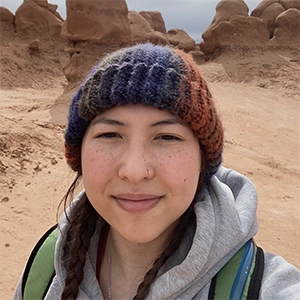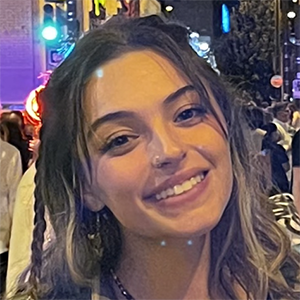DMCS is encouraging curiosity and sparking discovery of the marine environment
Our faculty and students engage in activities to broaden the impact of DMCS research and help make NJ and the world a better place. We are committed to working with communities to share knowledge and tackle environmental problems about the marine ecosystem.

Marin Marquez
“When I was 19 I decided to try some classes from the DMCS department because I’d always liked marine biology. I quickly discovered how encouraging and intelligent the professors were and decided I wanted to pursue a degree in marine biology. I was able to take courses which allowed me to conduct research both independently and in a field setting, which were pretty unique compared to my friends’ classes. While the work and material requires time and commitment, the unique classes offered at Rutgers gave me valuable skills that helped me stand out. With all the experience and academic knowledge I gained at Rutgers, I was able to get a job a few months after I graduated.
When I tell people I’m a marine biologist the most common response I receive is that they wanted to be a marine biologist, but they just weren’t sure if they could pursue a career in marine biology. As someone who was more than able to balance social life, academics, and my own health I can guarantee you if you passionately love the work you’re doing and prioritize school when the time is right, you can get everything you want.


Dr. Nicole Fahrenfeld and Dr. Robert Chant
Dr. Nicole Fahrenfeld of the civil and environmental engineering faculty at Rutgers, and Dr. Robert Chant, a faculty member in the Department of Marine and Coastal Sciences, have teamed up with Kraig Alan Williams of the Music Department at Mason Gross School of the Arts to produce a multimedia concert event, Deep Blue: The Beauty of Our Water World. The multimedia experience blends live music, video, still photography, lighting, live commentary from Bob and Nicole on their research, and other elements to communicate the dangers of microplastics in our waterways. This project is helping the public understand on-going research on microplastics and its impacts on our health and that of the environment.

Aviva Lerman
My name is Aviva Lerman and I am a senior undergraduate Directed Marine Studies major. Along with my major studies, I also minor in Microbiology and Science Communications. I am from Cherry Hill, New Jersey. From 2020, I have worked with Professor Saba and Emily Slesinger where I researched spawning dynamics of black sea bass in the Mid Atlantic. I participated in developing the best methodology for manually counting and sorting oocytes by developmental stage. Currently, I am working with Professor Bidle on viruses, aggregates and understanding the carbon cycle.
This summer, I was an educator at New Logic Marine Science Camp. Each week we taught a group of 20 K-8 campers about marine science, including marine biology, physics, chemistry, and coastal preservation. It was so rewarding to instill in the campers a strong sense of ocean stewardship. Some of my favorite highlights from our seine catches include seahorses, pipefish, and pufferfish! On my last day of work, we saw a juvenile green sea turtle that had wound up in Blackberry Bay.
